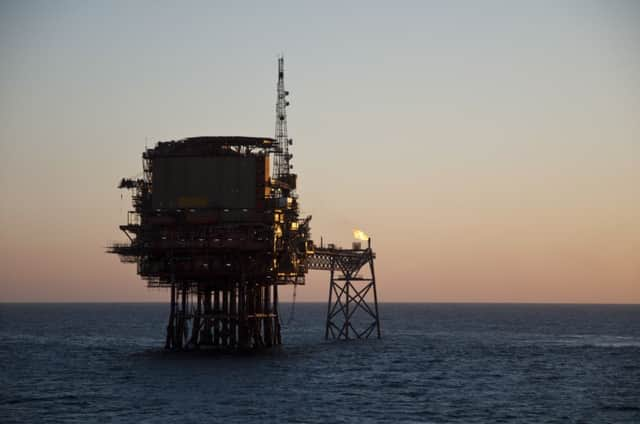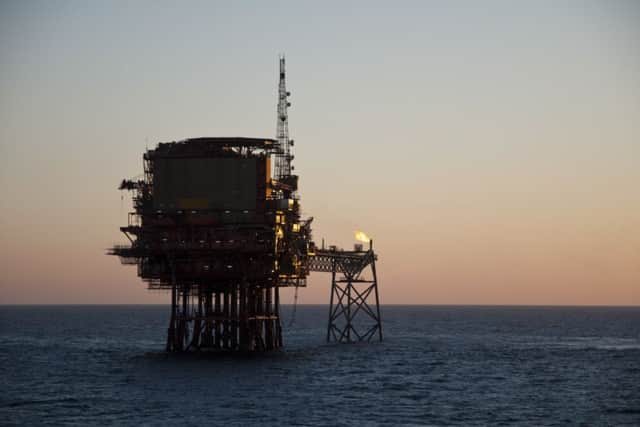Ministers’ fears for North Sea oil fields


With prices dropping to under $51 per barrel, Chancellor George Osborne updated Cabinet colleagues on its effect on the economy and fears grew over the future of thousands of Scottish jobs.
The tumbling oil price was on the agenda at the first meeting of the coalition Cabinet of 2015 as ministers discussed the economic challenges in the year ahead. The UK Cabinet met as benchmark Brent crude oil fell by $2 per barrel to $51.11, having been as low as $51.01 earlier in the day. It was the closest the oil price had to come to the $50 level last seen at the height of the global recession in 2009.
Advertisement
Hide AdAdvertisement
Hide AdLast month, a report by leading trade body Oil & Gas UK, skills group Opito and the Department for Business Innovation and Skills predicted the loss of up to 35,000 jobs in the industry over the next five years.


The report, published when the price was around $63, led Robin Allan, chair of the independent explorers’ association Brindex, to claim that “almost no new projects in the North Sea are profitable with oil below $60 a barrel”.
The latest fall came as the Scottish Government faced growing calls to intervene. Scottish Labour leader Jim Murphy urged Scottish ministers to set up a “resilience fund” to help the industry.
First Minister Nicola Sturgeon’s spokesman confirmed that the oil price crisis was not discussed at yesterday’s meeting of the Scottish Cabinet, prompting more anger from the SNP’s opponents.
CONNECT WITH THE SCOTSMAN
• Subscribe to our daily newsletter (requires registration) and get the latest news, sport and business headlines delivered to your inbox every morning
Critics have claimed that the falling oil price has been a huge embarrassment for the SNP, undermining the economic case it put for Scottish independence, which was based on an oil price of $110 per barrel.
Last night, the Scottish Conservative leader Ruth Davidson said: “The SNP told the people of Scotland the oil price would not only rise, but would stay there for as long as they needed it.
“That’s proved to be a deceit, and it is one the party has to explain. Now the price of oil has crashed, the silence from the SNP has been absolutely deafening.”
Advertisement
Hide AdAdvertisement
Hide AdIn contrast, the price of oil came up at the meeting of the UK Cabinet. Prime Minister David Cameron’s official spokesman told a regular Westminster media briefing that the slump was “significant” and was “certainly referred to” in the Chancellor’s Cabinet update, alongside the effects of economic instability in the eurozone and the coming Greek elections.
The spokesman acknowledged that the falling oil price had a positive effect in terms of the price people pay for fuel on the forecourts.
But he added: “There are also of course – and this is something the Chancellor, the Chief Secretary to the Treasury, the Energy Secretary and others have been looking at – potential sectoral impacts. We continue to work closely with the North Sea sector and the like.
“If you look across the UK economy as a whole, whilst noting and recognising the impact it may have on some specific sectors, it is good news for families up and down the country.”
Prices have fallen as a glut in supply coincides with shrinking demand, amid fears for world economic growth. Falling prices will also have an adverse on the UK oil industry, which employs 375,000 people – about half of whom are based in the north-east of Scotland.
Yesterday, Malcolm Webb, the chief executive of Oil & Gas UK, said: “The UK oil and gas industry is facing a particularly testing time with the sharp decline in oil price. If we are to maximise economic recovery of the UK’s very substantial oil and gas resources, we need all stakeholders to work collaboratively.”
Mr Murphy called for a pot of money for such economic shocks, held by the Scottish Government and funded through Barnett consequentials.
The upside of falling oil prices is that the plunge looks set to prove a boon for consumers as it feeds through to lower petrol costs and depressed inflation – currently at a 12-year low of 1 per cent and expected to fall further – but hurts the prospects of UK-listed companies.
Advertisement
Hide AdAdvertisement
Hide AdThe fall continues a slide started in June. Since then the oil price has fallen by more than half from a high of nearly $116 – at a time when the advance of Islamic State sparked fears over supplies from Iraq.
A combination of the US shale boom and weakness in the global economy – with the eurozone stagnant and Chinese growth slowing – has resulted in supply outpacing demand. The oil price came under further pressure in November when, despite this, Opec ministers decided not to cut supply.
Citigroup has cut its forecast for 2015 global oil prices with analyst Ed Morse predicting that the first half of 2015 would bring “a step-up in oversupply, more volatility and turmoil”.
Oil giant BP reported a fall in quarterly profits last autumn and its shares – which account for a slice of many UK pension funds – fell 5 per cent on Monday, and were down by 1 per cent yesterday. They have lost a quarter in value since June.
Shell reported a sharp rise in third-quarter profits but its shares were off 2 per cent yesterday and are about a fifth lower since last May.
Bank of England governor Mark Carney last month described the fall in the oil price as a “net positive development” for the UK while last night the Scottish Government had an optimistic view.
“Oil is a bonus, not the basis of Scotland’s economy, and will be a fantastic asset for decades to come,” a spokesman said.
SEE ALSO
SCOTSMAN TABLET AND IPHONE APPS